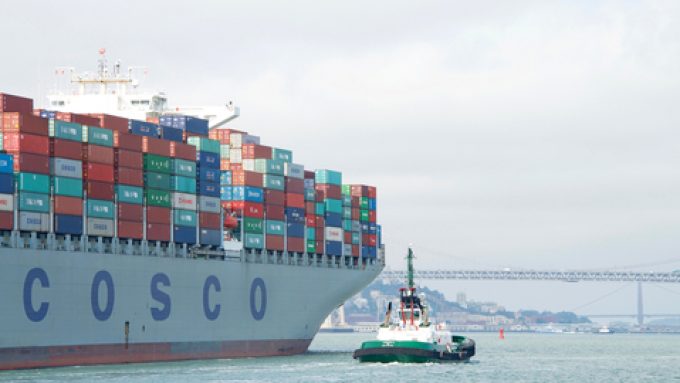US mega-airlines grow cargo volumes, but miss out on ecommerce boom
The three US mega-airlines – Delta, United and American – expanded their cargo traffic in ...
TFII: SOLID AS USUALMAERSK: WEAKENINGF: FALLING OFF A CLIFFAAPL: 'BOTTLENECK IN MAINLAND CHINA'AAPL: CHINA TRENDSDHL: GROWTH CAPEXR: ANOTHER SOLID DELIVERYMFT: HERE COMES THE FALLDSV: LOOK AT SCHENKER PERFORMANCEUPS: A WAVE OF DOWNGRADES DSV: BARGAIN BINKNX: EARNINGS OUTODFL: RISING AND FALLING AND THEN RISING
TFII: SOLID AS USUALMAERSK: WEAKENINGF: FALLING OFF A CLIFFAAPL: 'BOTTLENECK IN MAINLAND CHINA'AAPL: CHINA TRENDSDHL: GROWTH CAPEXR: ANOTHER SOLID DELIVERYMFT: HERE COMES THE FALLDSV: LOOK AT SCHENKER PERFORMANCEUPS: A WAVE OF DOWNGRADES DSV: BARGAIN BINKNX: EARNINGS OUTODFL: RISING AND FALLING AND THEN RISING

Cosco Shipping Holdings deputy GM Chen Shuai has sought to calm concerns that the overcapacity seen after the 2008 global financial crisis could be repeated, thanks to the huge number of newbuildings on order.
Mr Chen was speaking at a media briefing last week to discuss Cosco Ship Holdings’ financials for the first nine months of 2022.
During the period container shipping volumes declined, to 18.5m teu from 20.4m teu a year ago, but turnover was up 37%, year on year, to $44.46bn, and net profit rose 48%, to $16.2bn.
“Shipping line profit margins have been better than in 2007, but the orderbook-to-fleet ratio is nowhere near the 64% seen in 2008,” said Mr Chen.
“Many of the newbuildings that will be delivered in the next two years are in the 5,000-15,000 teu range, and these will be used to optimise and upgrade the fleet structure.”
As shipping lines achieved all-time high profits on the back of Covid-19-related logistics bottlenecks and port congestion, a record 561 boxships were ordered last year, up more than fourfold from 2020.
CSH, parent of Cosco Shipping Ports, Cosco Shipping Lines and OOCL, has itself 42 ships on order, including Cosco Shipping and OOCL’s order for a dozen 24,000 teu vessels in October this year and 20 ordered in September and October last year. The newbuildings will be delivered between 2023 and 2025.
Mr Chen said Cosco would adjust its vessel capacity according to market demand – currently, liner operators are blanking sailings in response to weakening cargo volumes.
He added: “Amid increasingly stringent environmental regulations, the scrapping of older vessels and slow-steaming could provide some restriction on effective vessel supply, and this will help maintain the weak supply-demand balance.”
Without disclosing whether shippers had sought to renegotiate long-term shipping contracts, Mr Chen said Cosco Shipping had been “communicating with contractual counterparties to comply with their wishes”.
To improve port access, Cosco Shipping Holdings will increase its stake in Shanghai International Port Group to 15.55% by the year-end, and its investments in infrastructure, such as trailer platforms, warehouses and logistics parks, to improve the group’s container logistics capabilities.
Comment on this article